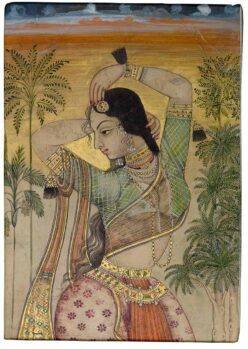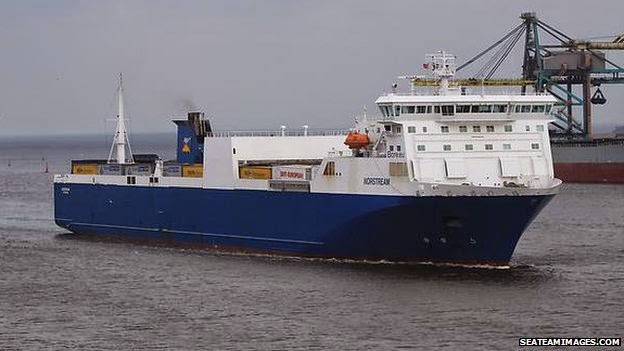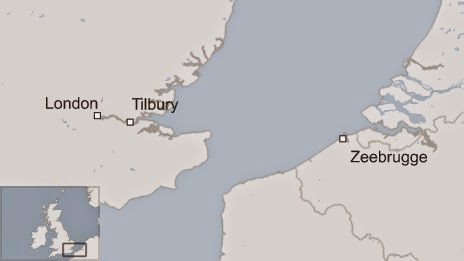from India….key role in making Scotland the most industrialised
country by the mid-19th century….Dundee
and Paisley were transformed by their trade in jute and textiles with
India….a man has died after 35 people found in a shipping container….survivors from the Indian subcontinent….staff alerted by
“screaming and banging” from inside…
….
The “trade” between India and the United Kingdom in the colonial period was an euphemism for brutal exploitation. Indian manufacturing was destroyed by unfair tariffs in the UK. Thus “trade” consisted of India exporting raw materials (cotton, jute) at dirt prices and to buy English-Scottish finished goods (gunny bags, clothes) at high prices.
For thousands of years, India was known far and near as the promised land. First came the plundering armies, the missionaries followed, and not far behind were the “flood” of job-seeking immigrants. It was the promises of the Indian empire holdings (East India Company) that encouraged Scotland to forge and continue with a union pact with England (01 May 1707). Now that the charms of a captive foreign market is gone, Scotland finds the centuries old bonds to be an irritant (Scotland votes for partition-independence on September 18, 2014).
………
…..
The good face of colonialism we know: British gave us a sense of nationality (which was useful in the fight for freedom, many Scots played an important role), they taught us the first principles of democracy (which we are still learning to master) and all that.
….
The sad face of colonialism….it is now considered bad form to speak about it. The Victorian Holocausts which knocked off large percentages of the population is a good place to start. If there is any one event that stands out that would be the Bengal famine of 1943 when 4.3 million people perished. While Indian merchants certainly stocked grains and contributed to the problems in supply, it was a British administration that was responsible in a direct (as well as indirect) manner.
Now the bowl has upturned and immigrants plan to leave India for the West…anyhow. Their desperation is such that they do not care that they may end up losing their lives.
…….
The good picture of Indians migrating to the West and living out the American (or Canadian, Australian…) dream is well viewed. There is a sad picture as well which mostly stays underground unless there is a explosion and then we discover the mess.
Surprisingly it is not just Indians (and other poor people) who are desperate to leave. As many as 58 citizens of the newly minted superpower also died trying to cross over to the UK from Zeebrugge in June. How come the Chinese (both poor and the super affluent) are fleeing their country? This almost never happens, people do not just up and quit the lands of opportunity….unless the Chinese know something about their country that we outsiders do not know about (see below).
…..
are said to be recovering “fairly quickly in most cases” at nearby
hospitals.
They were discovered after a freighter arrived from Zeebrugge, Belgium at about 06:00 BST and was being unloaded. Essex Police have launched a homicide investigation and officers are being assisted by their Belgian counterparts.
Supt Trevor Roe said staff at the docks were alerted to the container by “screaming and banging” from inside. He said about 50 other containers on
the freighter, called the Norstream, had been searched and no other
people were discovered inside.
Speaking at a press conference, Mr Roe told journalists the
survivors were being held under immigration powers and would be taken to
an immigration reception centre near Tilbury. He said they would eventually be interviewed through interpreters.
Belgian police say they believe the lorry which delivered the
container in Zeebrugge has been identified through CCTV footage. They
do not, however, have information yet about where it originated from. Mr Roe said the police investigation would look into “the
gangs or whoever may be involved in this conspiracy to bring these
people in this way over to this country”.
It is not known where the container, one of 64 aboard the
P&O vessel, originated. Mr Roe also said he did not know where the
survivors had been going.
At Basildon hospital police vans were parked in between rows of ambulances in a clash of high-visibility stripes and chevrons. At the dropping-off zone in front of the entrance, patients
came and went, glancing up at the news helicopter circling overhead.
Most were aware of the high-security patients being treated
in a cordoned-off section of the accident and emergency unit; the
atmosphere became more relaxed when it became clear that their
conditions were primarily dehydration and hypothermia, and nothing more
serious or contagious.
Immigration and security minister James Brokenshire said the
incident was “a reminder of the often devastating human consequences of
illegal migration”. He said: “We know that criminal gangs are involved in what
amounts to a brutal trade in human lives. We also know that illegal
migration is a Europe-wide issue.
“That is why we work closely and collaboratively with law
enforcement and port authorities, in neighboring countries, to target
criminal networks and ensure that the organised gangs behind trafficking
and people smuggling can’t operate with impunity.”
The East of England Ambulance service, which was called to the
docks at 06:37 BST, sent seven ambulances, two rapid response cars, two
doctors and a hazardous area response team to the scene.
Assistant Chief Officer Daniel Gore from the ambulance
service said none of the people being treated in hospital was thought to
have life-threatening conditions.
Part of Basildon Hospital, where 18 people from the container were taken for treatment, was taped off earlier. On its website, the hospital said its accident and emergency department was “responding to a major incident”.
Seven patients were taken to Southend Hospital while nine were taken to the Royal London Hospital, Whitechapel. South Basildon and East Thurrock MP Stephen Metcalfe described the incident as “tragic”. Mr Metcalfe told the BBC: “The fact that so many people
appear to have traveled so far and are so desperate to get into the UK –
either on their own or being trafficked is really very sad.”
The Conservative MP said it was important “to get to the root
causes of what is motivating people to go to such extreme lengths to
travel from other parts of the world to get into the UK” as well as
tackle people trafficking.
The container was loaded on to the P&O freighter at about 21:30 BST on Friday at Zeebrugge.
A P&O spokeswoman said the Norstream, which had been
scheduled to leave Zeebrugge at 22:00 BST on Friday, was also carrying
72 trailers and five lorries and their drivers.
Public Health England said it was not currently involved and had not been notified of there being any Ebola risk. Essex Ambulance said decontamination units had been set up at
the docks as a precaution, not because of any specific concerns it had. A spokeswoman for the port declined to comment on the incident as it “was a matter for the police and Border Force”.
The ship was sailing on a new service linking Tilbury and Zeebrugge which has only been operational since earlier this month, according to parent company Forth Ports.
According to the UK Border Force, the number of “clandestine
illegal entry attempts” by people to enter the country via ports in
Belgium and France increased last year to 18,000 from about 11,000 in
the previous 12 months.
The Freight Transport Association said it was “quite unusual”
for stowaways to be found in containers, with most cases involving
people attempting to enter the UK on lorries.
In June 2000, the bodies of 58 Chinese people were found in
the back of a lorry smuggling them into Dover on a ferry from Zeebrugge.
They had died of suffocation.
…..
India’s special place in Scottish history is partly a legacy from the
union of Scotland with England in 1707 to create the United Kingdom.
Under the deal, Scotland’s landed families gained access to the East
India Company, and gradually become its dominant force.
Scots
flooded into India as “writers” , traders, engineers, missionaries, tea
and indigo planters, jute traders and teachers. According to Professor
Tom Devine, author of The Scottish Empire, by 1771 almost half of the
East India Company’s writers were Scots, and by 1813, some 19 of
Calcutta’s private merchant houses were dominated by Scots.
Remittances
from India played a key role in making Scotland the most industrialized
country in the world by the mid-19th century, and cities like Dundee
and Paisley were transformed by their trade in jute and textiles with
India.
……
keep them at home, the Chinese ventured overseas in search of knowledge,
fortune and adventure. Manchu Qing rulers thought those who left must
be criminals or conspirators and once forced the entire coastal
population of southern China to move at least 10 miles inland.
even that didn’t put an end to wanderlust. Sailing junks ferried
merchants to Manila on monsoon winds to trade silk and porcelain for
silver. And in the 19th century, steamships carried armies of “coolies”
(as they were then called) to the mines and plantations of the European
empires.
open. Almost anybody who wants a passport can get one. And Chinese
nationals are leaving in vast waves: Last year, more than 100 million
outbound travelers crossed the frontiers.
are tourists who come home. But rapidly growing numbers are college
students and the wealthy, and many of them stay away for good. A survey
by the Shanghai research firm Hurun Report shows that 64% of China’s
rich—defined as those with assets of more than $1.6 million—are either
emigrating or planning to.
the departure of China’s brightest and best for study and work isn’t a
fresh phenomenon. China’s communist revolution was led, after all, by
intellectuals schooled in Europe. What’s new is that they are planning
to leave the country in its ascendancy. More and more talented Chinese
are looking at the upward trajectory of this emerging superpower and
deciding, nevertheless, that they’re better off elsewhere.
……
Link (1): bbc.com/uk-england-28817688
Link (2): Indias-Scottish-heritage-remembered-in-renovation-of-Calcutta
Link (3): online.wsj.com/articles/the-great-chinese-exodus-1408120906
…..
regards



